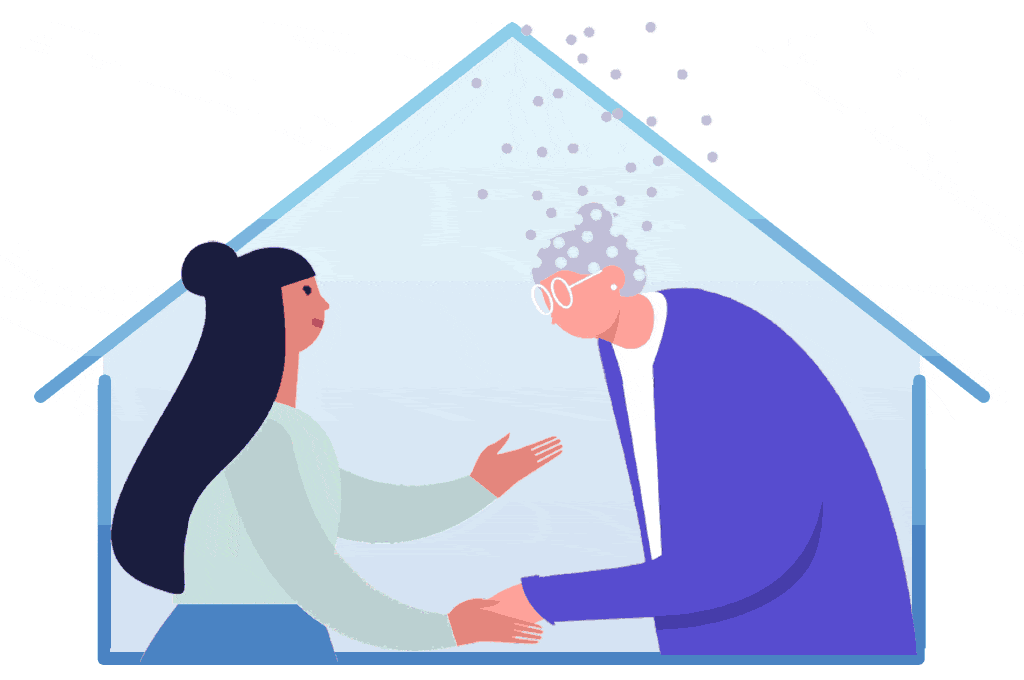


Alzheimer’s is a sad and overwhelming disease. Not just for those diagnosed with it, but for the entire family who experiences the decline in their loved one. In the U.S., 6 million people over the age of 65 have Alzheimer’s. The majority of these people continue to live in their community, most often in home settings. The pandemic has further complicated caring for those with dementia as services become more limited and precious routines are disrupted.
If there is one bit of solace we can offer, it’s that you’re not alone. There are countless resources and support services available on this journey. This includes the dedicated help of a qualified in-home caregiver, to relieve some of the burden on you. Hiring the right in-home help might also enable your loved one to stay home longer. This can stave off an unwanted (and expensive) move to an assisted living or nursing facility, so long as it remains safe and possible to be at home.
Coping with dementia in the family was hard enough before COVID, which has further complicated an already difficult situation. Do you intend to hire an in-home caregiver to assist you and your family? The Alzheimer’s Association shares several tips for supporting people who receive paid, home-based services amidst the pandemic, including:
Many of you will continue to care for family members yourself. But without the support of a qualified caregiver, the immense burden can weigh heavily on you and your family. As you navigate this new world, please be kind to yourself. And please know that you have help should you need it. At 1+1 Cares, we aim to make the process of finding the right caregiver easy, straightforward, and affordable.
In the meantime, consider a few realities and coping mechanisms, including:
It may also be cathartic to know what to expect down the road, as the symptoms of dementia progress. One primary care clinic describes your role as caregiver as changing over three stages:
Lastly, take care of yourself, so you can take care of others. As you consider hiring a qualified in-home caregiver, prioritize your own health, too. Monitor your own stress and exhaustion and seek medical care as you need it. Stay active with exercise, eat well, and make time for yourself. Reach out to friends or others, especially people that have or are going through their own challenges with Alzheimer’s or dementia in a loved one. The Alzheimer’s Association offers a range of support, including a helpline (800-272-3900), local chapters, a virtual library, and a planning tool.
If you do connect with a caregiver, you’ll likely find more time to take care of yourself. As a result, you can provide focused care and truly enjoy the time you do spend with your loved one.
We find that checklists are a welcome tool to help families navigate the caregiving process. As you seek a qualified caregiver to assist your loved one, keep these six considerations in mind:
We hope these six checklist items help you navigate the caregiver selection process for a loved one with Alzheimer’s or dementia. 1+1 Cares is proud to check the box on every one of these items. But even if you don’t end up going with us, we hope that you’ll take these considerations into account. Following these considerations will help protect you and your aging loved one during a difficult time. It will also ensure an ideal match for your family, right in your community. For more, please reach out today to schedule a call!
One option for help with dementia is a qualified in-home caregiver referred by 1+1 Cares. Since 2007, our mission has been to make high-quality, affordable care accessible and to provide meaningful impact for the people who need assistance, the families who love them, and the caregivers who perform these critical services.
When a loved one is diagnosed with Alzheimer’s or dementia, our unique services make your journey a bit more manageable. For example, cost is a real concern for families. When you arrange for in-home care from a caregiver referred by 1+1 Cares, our costs are typically 30 percent less than traditional in-home care agencies.
Lower the stress of caring for your family member with help from a professional caregiver referred by 1+1 Cares. At first, some families may need just a little help. We can refer to you qualified caregivers for hourly services and routine visits. This might be a meal or medication delivery, home cleaning, or pet grooming. There is no minimum number of hours, so you pay only for what you actually need.
Other families may need a bit more help, and we can do this, too. With Alzheimer’s and dementia, you will likely benefit the most from 24-hour care.
Often, with 24-hour care, two caregivers rotate in 12-hour shifts or three caregivers rotate in eight-hour shifts. Caregivers are present and awake during the entire shift (versus live-in caregivers who may sleep on-premise or leave during the overnight hours). With Alzheimer’s and dementia, your loved one may require around-the-clock monitoring for health or safety reasons. Another benefit of having rotating shifts is that it can prevent “caregiver burnout”. You’ll have built-in backup options for caregivers who are familiar with your needs should someone take a vacation or get sick.
Across the world, 50 million people live with Alzheimer’s and other dementias, according to the Alzheimer’s Association. Alzheimer’s itself is a specific degenerative brain disease, whereas dementia describes a set of symptoms, such as a decline in reasoning or memory. Alzheimer’s is the most common cause of dementia, and there is no known way to prevent, cure, or slow it. (For more, the Alzheimer’s Association also has a helpful “Brain Tour” to explain how the brain works and what Alzheimer’s effect is on it.)
